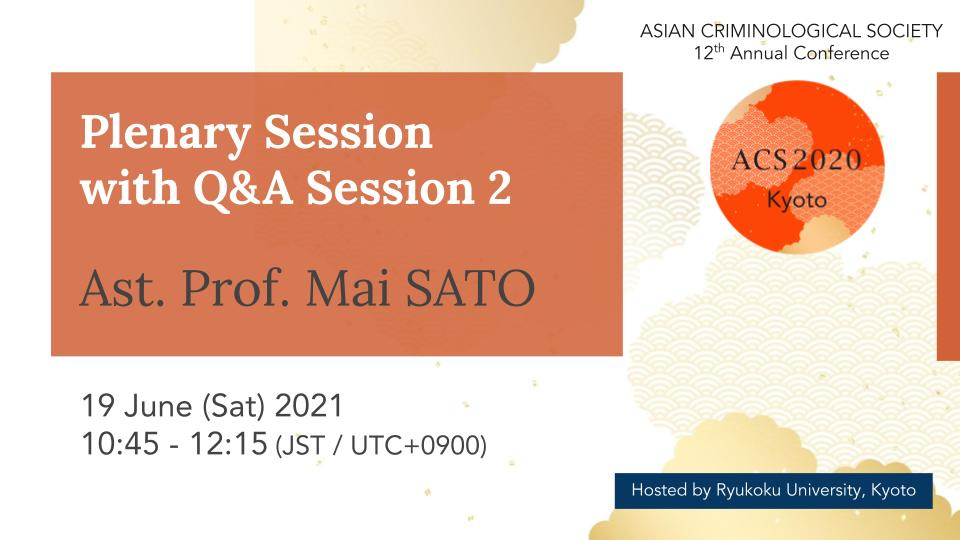2021.08.06
[Report of the ACS2020] Plenary Session with Q&A Session_Ass. Prof. Mai Sato
Politics of abolition: international advocacy against the death penalty
The Asian Criminological Society 12th Annual Conference (ACS2020), hosted by Ryukoku University, was held online for four days from June 18 to 21, 2021. The purpose of the conference, the second of its kind to be held in Japan after the 2014 Osaka conference, was to promote the growth of criminology in Asia and Oceania, and to promote academic exchange with advanced regions of criminology such as the United States and Europe.
>> ACS2020 Program https://acs2020.org/program.html
The overall theme of the conference is "Crime and Punishment under Asian Cultures: Tradition and Innovation in Criminology". The aim was to promote understanding of the social systems and culture and measures against crime and delinquency in Japan, which is said to be "the country with the least crime in the world".
The following is a summary of the Plenary Session with Q&A Session, which was held live streaming at the conference.
- Plenary Speaker: Mai Sato (Associate Professor of Criminology, Director, Eleos Justice, Monash University, Australia)
- Chair: Shin-ichi ISHIZUKA (Professor, Faculty of Law, Ryukoku University, Japan)
- Date: 10:45-12:15, 19 June, 2021
- Keywords: abolition of the death penalty, sexual minorities, state-sanctioned killings, international organizations and non-governmental organizations, drug policy, data collection, false convictions and false snowflakes


Mai Sato (Associate Professor of Criminology, Director, Eleos Justice, Monash University, Australia)
The international landscape of death penalty retentionists versus abolitionists has flipped, compared to fifty years ago when only a handful of states had abolished the death penalty in law or practice. Today, abolitionist states make up nearly two-thirds of the countries around the world, with global and regional organizations as well as some abolitionist governments working towards the universal abolition of the death penalty. While the majority of death penalty research has emanated from and focuses on the US, well over 90 per cent of global executions take place outside of the US, even when we exclude executions carried out in China. In 2018, the Australian government, while being surrounded by retentionist states, has joined the international advocacy against the death penalty. The first part of my presentation is about how international organisations define, measure, and track the progress towards the global abolition of the death penalty – and what we may be overlooking as a result. The second part of my presentation concerns the roles governments and organisations (can) play in the abolition of the death penalty.
Summary of the Q&A Session
Question 1: Why has there been no movement towards abolition of the death penalty in Asia?
Answer 1: Almost no European countries (with the exception of Belarus) have the death penalty. "Abolition of the death penalty" is a prerequisite for membership in the EU and for becoming a member state of the Council of Europe. Compared to Europe, Asian countries seem to lack incentives for abolishing the death penalty, as well as strong organizations to address the issue and lead the movement to abolish the death penalty across national borders. Incidentally aside, Brexit, which occurred in 2020, had no impact on policies regarding the death penalty.
Question 2: What are the differences between international organizations (Amnesty, EU, etc.) and domestic NGOs?
Answer 2: An international organization cannot lead an abolition movement on its own. There are two stages to how a transnational norm (abolition of the death penalty) is transformed, localized, and internalized: (1) rhetorical introduction, and (2) the process of localization and internalization. International organizations may be able to play a role in stage (1).
Question 3: What are some possible strategies for gaining support for the abolition of the death penalty in Asian countries?
Answer 3: In Asian countries, there are problems such as a lack of data, and rhetoric surrounding the "War on Drugs.'' Therefore, if we want to abolish the death penalty, it is important to enable universities and organizations to collect research and data, which can then be used for advocacy. Collecting as much data as possible through research and studies will make the advocacy more scientific (evidence-based).
On the issue of the death penalty, it is particularly important to look at drug policies in Asia. The Eleos Justice Institute at Monash University provides a platform for connecting various Asian human rights NGOs and conducting collaborative research. I would like to discuss this in the next session [Round Table 01], "Politics of Death Penalty Abolition and Retention in Asia" (June 21, 2021, 13:00-14:30 [Chair: Mai Sato]). I would also like to discuss this in my presentation, "Politics of Death Penalty Abolition and Retention in Asia" on June 21, 2021.
The discourse on "false convictions," which is used to move toward abolition of the death penalty, has been very influential in dissuading American citizens from supporting the death penalty. However, there is some doubt as to whether it will be a powerful discourse in Asian countries.
Question 4: In my discussions with students, I feel that "innocence" is very influential in advancing the debate on abolishing the death penalty. I believe that the discourse surrounding the abolition of the death penalty will change in the future, but at present, there is a lack of information on the death penalty in Japan. I believe that more information should be disseminated.
Answer 4: I agree that the discourse on "innocence" is influential in Japan. According to a public opinion survey on "Attitudes toward the Death Penalty System" conducted by the Cabinet Office, the problem of miscarriages of justice ("When there is a mistake in a trial, if the death penalty is imposed, it cannot be undone") is one of the top reasons why people want to abolish the death penalty. However, it can be said that this is because the criminal justice system is believed to be "safe" to some extent in Japan. In some Asian countries, people's trust in the criminal justice system is low. Even if the "innocence" argument is used in such countries, it is unlikely to be persuasive because people will think, "The criminal justice system is already broken, so it is natural that false convictions will occur."
Question 5: The reality is that sexual minorities are being "killed" by the state (government). In Japan, however, discussions linking sexual minorities to the death penalty and "killings by the state (government)" have been slow to develop.
Answer 5: In Japan, homosexuality is not criminalized in the first place. However, there seems to be little awareness that the debate over "LGBTQI" is a human rights issue. The Japanese government will probably say that the death penalty should not be applied to homosexual acts. It is meaningful with regard to discrimination against sexual minorities that Japan, a country with the death penalty, makes such a statement. It is more persuasive than a country that abolishes the death penalty appealing to a country that has the death penalty to abolish it. I think it is an effective way to reduce the number of countries with the death penalty.
In the following "State-Sanctioned Killing of Sexual Minorities" report, there is a report on the murder of Alireza Fazeli Monfe'ad in Iran (a case in which Ali, a homosexual, was murdered by his relatives).
Please refer to it.
https://bridges.monash.edu/articles/report/State-Sanctioned_Killing_of_Sexual_Minorities_Looking_Beyond_the_Death_Penalty/14069318/3
Keynote session by Prof. David Garland, "What's Wrong with Penal Populism?" As discussed in “What's wrong with ‘penal populism’? Politics, the public, and penological expertise”, criminologists do not have the power to influence government decisions, but they can research and provide evidence on the death penalty and penal system. The issue of sexual minorities and the death penalty is not fully theoretically explained or discussed at this stage, but it will be an important issue to be discussed at the meta-level in the future.
Question 6: In countries where it is difficult to collect information and data, how will you collect the information/data?
Answer 6: It is true that in some countries where the death penalty exists, even data collection is difficult and academic freedom is not guaranteed. However, researchers are making an effort and are collecting data in their own way. For example, activists in Bangladesh are collecting information on the number of "extrajudicial killings" (immediate executions). The details will be discussed in the next roundtable.
Please refer to the following website for more information.
https://www.monash.edu/law/research/eleos/events
https://www.eventbrite.com.au/e/in-conversation-with-professor-william-schabas-tickets-151594359811